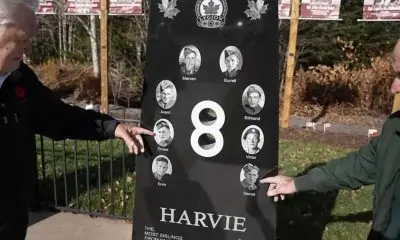MONTREAL – Matt Coronato scored the game-tying goal and the overtime winner in a dramatic finish, but video coach Jamie Pringle was the hero on Tuesday night.
Before Coronato powered a Calgary Flames comeback, Brendan Gallagher appeared to give the Montreal Canadiens 3-1 lead with 8:24 remaining in the third.
Pringle, however, instantly flagged the goal for offside. Then the Flames challenged successfully, and Coronato did the rest as Calgary flipped the script and won 3-2 in overtime.
“I was just saying that a post is normally a goalie’s best friend, but I think the video coach is now number two,” Flames netminder Dustin Wolf said.
Canadiens forward Josh Anderson had set up Gallagher on an odd-man rush, though it was unclear in real-time if Anderson had full control of the puck when he entered the Flames’ zone backward.
The Bell Centre’s roof nearly blew off with Canadiens fans celebrating like it was a sure thing, but Pringle thought otherwise.
“We’ve always been confident in Jamie,” Flames head coach Ryan Huska said. “He’s the best guy in the league. So another situation where he flashed it up, challenge right away.
“We don’t get this win if it’s not for the courage that he showed. You have a great guy in that chair for a reason. And Jamie did a great job for us, keeping us in this game tonight.”
Pringle, a 49-year-old from Picton, Ont., who’s also known as “Chips,” is in his 14th season with the Flames.
And it wasn’t the first time he played a crucial role in a victory this season.
In Calgary’s 4-1 win over the Edmonton Oilers on Oct. 13, the video coach successfully challenged two goals, including one Corey Perry deflection that the hockey world was convinced should have counted.
Pringle made the snap decision anyway, even though a failed challenge would put his team on the penalty kill.
“He’s hot this year,” forward Blake Coleman said. “You know what? He needed to redeem himself after a tough last year. We had some good chats down the stretch, and he’s been on fire.
“I’d say of all the guys on our team, he’s probably the one who hasn’t missed a night so far.”
Coronato showed up at the right time on Tuesday.
The 21-year-old winger tied the game with 2:46 remaining in regulation when he cruised into the slot and went off the post and in. He then buried the winning goal seven seconds into the extra period, coming one second shy of tying the fastest OT goal in NHL history.
“He’s remarkable. He’s had so many chances to score, and he’s kind of been snaked bit a few times,” Wolf said. “To see him score on two unbelievable shots, that’s a scouting report on him, his shot’s lethal.”
“The kid can shoot it,” Coleman added. “Couple big ones.”
Coronato, a 13th overall pick in the 2021 NHL draft, spent most of last season in the American Hockey League with the Calgary Wranglers.
This season, he’s played two games in the AHL and eight in the NHL. And with performances like Tuesday’s, he can expect plenty more in the big leagues.
“Sometimes with younger players, you put them in the American League for a bit and it’s hard on them,” Huska said. “There’s a long-term plan for sure. We know how good he’s going to be for us. We just want to make sure that we are putting him in situations that he’s going to be ready for and be able to have success.
“He’s done an excellent job of preparing himself to play, and we saw the result of his effort tonight.”
The Flames (7-5-1) picked up their second win in seven games to kick off a three-game road trip. Meanwhile, the Canadiens (4-7-2) dropped their fourth in a row ahead of four games away from home.
“We didn’t throw up on ourselves tonight, but we still feel a bit sick to our stomachs,” head coach Martin St. Louis said, referencing a post-game assessment he delivered after a 6-3 loss last week in Washington.
The Canadiens didn’t paint a picture of doom and gloom in the dressing room despite coming a couple minutes shy of securing two points and snapping their skid, but St. Louis said his players should leave this game “hungry” to get in the win column.
“If I was in their shoes, I’d wish we played tomorrow,” he said. “That’s what I would want to feel like. That’s what I want to be like.”
This report by The Canadian Press was first published Nov. 5, 2024.


























